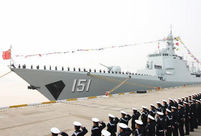Local Party chief urges strong steps against separatism
Maintaining social stability and forging a lasting peace have become the top priorities in the Xinjiang Uygur autonomous region after President Xi Jinping presided over a meeting in December to hear reports from top officials from the region, local media reported on Tuesday.
According to Xinjiang Daily, the meeting was held by the Standing Committee of the Political Bureau of the Communist Party of China Central Committee on Dec 19, four days after 14 terrorists were shot dead as they attacked police officers with knives and explosives in Shufu county, southern Xinjiang's Kashgar prefecture. Two officers were killed in the clash.
People should bear in mind that Xinjiang's stability is relevant to the whole country, and maintaining it long-term should be the No 1 task for the region in the future, Zhang Chunxian, Party chief of Xinjiang, was quoted as saying.
Zhang added that Xinjiang officials must clearly understand the region's situation and take the initiative in the battle against separatism.
Xi said at the meeting that economic development in the region has sped up, the living standard of people has increased and the ability to maintain social stability has improved since the central government held a work conference on Xinjiang's development in 2010.
That conference, which took place a year after the deadly riot in Urumqi that left 197 people dead, set strategic plans for the region's leapfrog development and lasting stability.
Despite the region's development in the past few years, problems undermining its stability have not been fundamentally solved, as foreign and domestic separatist forces have intensified their activities, Yu Zhengsheng, a member of the Standing Committee of the Political Bureau of the CPC, said in June.
Yu's remarks came after an attack on June 26 rocked Lukqun township, Turpan prefecture. Twenty-four people were killed by terrorists.
Xinjiang experienced a series of terrorist attacks in 2013, many of which directly targeted local authorities such as police officers. Terrorists in Xinjiang became more active and their attacks became more frequent in 2013, Xinhua News Agency said after nine terrorists attacked a police station in Yarkan county in Kashgar, throwing explosives and setting fire to police cars on Dec 30.
Ma Pinyan, a senior antiterrorism researcher and deputy director of the ethnic and religious studies center at Xinjiang Academy of Social Sciences, said the penetration of religious extremism in the region has led to increased attacks, many of which are suicidal and difficult to prevent.
Experts also worried that terrorist activities in Xinjiang might spread to other parts of China after five people, including three attackers, were killed and another 40 injured on Oct 28 after a jeep, driven by Usmen Hasan and carrying his mother and wife from Xinjiang, crashed into a crowd at Tian'anmen Square.
Police later confirmed the incident as a terrorist attack that was planned by the East Turkistan Islamic Movement. Five suspects were detained.
Terrorism is one of the key factors that cause social instability and restrain economic development in Xinjiang, said Zhu Hui, an expert in political science from the Party school of the region. He hoped that the establishment of a State security committee could help the region more effectively eliminate the threat.
According to a communique issued in November after the Third Plenary Session of the 18th Central Committee of the CPC, China will set up a State security committee that aims at improving systems and strategies to ensure national security.
"The committee could lay out a long-term strategic plan at the national level to fight terrorism in Xinjiang. It is also expected to coordinate different forces that could safeguard the national security in different departments in the government and army to tackle the root of the problem. What's more, the integration of those forces could make Xinjiang deal with terrorist attacks more swiftly and effectively," Zhu said.
 Chinese Consulate General in S.F. burned for arson attack
Chinese Consulate General in S.F. burned for arson attack Roar of J-15 fighter is melody for operator on the Liaoning
Roar of J-15 fighter is melody for operator on the Liaoning A 90-year-old forester's four decades
A 90-year-old forester's four decades Most touching moments in 2013
Most touching moments in 2013 2013: Joys and sorrows of world politicians
2013: Joys and sorrows of world politicians Missile destroyer Zhengzhou commissioned to Chinese navy
Missile destroyer Zhengzhou commissioned to Chinese navy China is technically ready to explore Mars
China is technically ready to explore Mars Photo story: Life changed by mobile technology
Photo story: Life changed by mobile technology Bullet train attendants' Christmas Eve
Bullet train attendants' Christmas Eve Exploring the 'Maritime Silk Road'
Exploring the 'Maritime Silk Road' Armed Police hold anti-terrorism drill in SE China's Xiamen
Armed Police hold anti-terrorism drill in SE China's Xiamen Beautiful churches around the world
Beautiful churches around the world Panda cub Yuan Zai made public debut in Taiwan
Panda cub Yuan Zai made public debut in Taiwan  Stuffed polar bears displayed at Int'l Snow Sculpture Expo
Stuffed polar bears displayed at Int'l Snow Sculpture Expo Photographer captures frozen scenery in U.S.
Photographer captures frozen scenery in U.S.Day|Week|Month